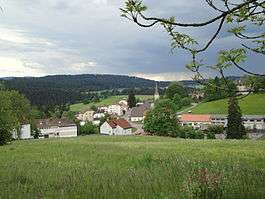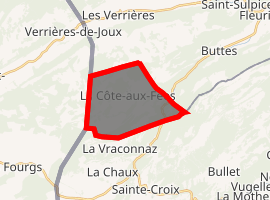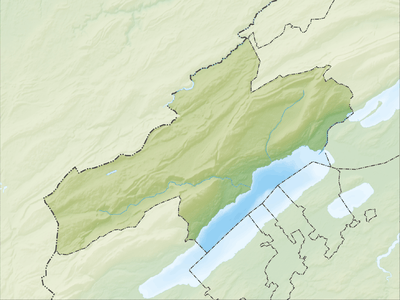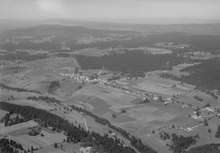La Côte-aux-Fées
La Côte-aux-Fées is a municipality in the district of Val-de-Travers in the canton of Neuchâtel in Switzerland.
La Côte-aux-Fées | |
|---|---|
 View of La Côte-aux-Fées from North-East | |
 Coat of arms | |
Location of La Côte-aux-Fées 
| |
 La Côte-aux-Fées  La Côte-aux-Fées | |
| Coordinates: 46°52′N 6°29′E | |
| Country | Switzerland |
| Canton | Neuchâtel |
| District | Val-de-Travers |
| Area | |
| • Total | 12.85 km2 (4.96 sq mi) |
| Elevation | 1,041 m (3,415 ft) |
| Population (2018-12-31)[2] | |
| • Total | 442 |
| • Density | 34/km2 (89/sq mi) |
| Postal code | 2117 |
| SFOS number | 6504 |
| Surrounded by | Buttes, Fiez (VD), Les Fourgs (FR-25), Les Verrières, Sainte-Croix (VD), Verrières-de-Joux (FR-25) |
| Website | http://www.lacote-aux-fees.ch SFSO statistics |
History
La Côte-aux-Fées is first mentioned in 1337 as La Costa des Faies.[3]
Geography

La Côte-aux-Fées has an area, as of 2009, of 12.9 square kilometers (5.0 sq mi). Of this area, 7.15 km2 (2.76 sq mi) or 55.6% is used for agricultural purposes, while 5.27 km2 (2.03 sq mi) or 41.0% is forested. Of the rest of the land, 0.39 km2 (0.15 sq mi) or 3.0% is settled (buildings or roads), 0.01 km2 (2.5 acres) or 0.1% is either rivers or lakes and 0.04 km2 (9.9 acres) or 0.3% is unproductive land.[4]
Of the built up area, housing and buildings made up 1.9% and transportation infrastructure made up 0.5%. Out of the forested land, 35.8% of the total land area is heavily forested and 5.2% is covered with orchards or small clusters of trees. Of the agricultural land, 36.5% is pastures and 19.1% is used for alpine pastures. All the water in the municipality is in lakes.[4]
The municipality is in the Val-de-Travers district. It consists of about a dozen hamlets, the most important of which is Les Bolles-du-Temple.
Coat of arms
The blazon of the municipal coat of arms is Azure, a Lamb Argent passant on a base Vert. This is an example of canting since the old version of the name is Coste eis Faes or hill of the lambs.[5]
Demographics
La Côte-aux-Fées has a population (as of December 2018) of 442.[6] As of 2008, 8.2% of the population are resident foreign nationals.[7] Over the last 10 years (2000–2010) the population has changed at a rate of -13.6%. Migration accounted for -6.7%, while births and deaths accounted for -3.3%.[8]
Most of the population (as of 2000) speaks French (496 or 93.8%) as their first language, German is the second most common (22 or 4.2%) and Portuguese is the third (7 or 1.3%). There are 2 people who speak Italian.[9]
As of 2008, the population was 50.3% male and 49.7% female. The population was made up of 212 Swiss men (46.8% of the population) and 16 (3.5%) non-Swiss men. There were 208 Swiss women (45.9%) and 17 (3.8%) non-Swiss women.[10] Of the population in the municipality, 160 or about 30.2% were born in La Côte-aux-Fées and lived there in 2000. There were 132 or 25.0% who were born in the same canton, while 142 or 26.8% were born somewhere else in Switzerland, and 64 or 12.1% were born outside of Switzerland.[9]
As of 2000, children and teenagers (0–19 years old) make up 18.3% of the population, while adults (20–64 years old) make up 56.7% and seniors (over 64 years old) make up 25%.[8]
As of 2000, there were 195 people who were single and never married in the municipality. There were 246 married individuals, 54 widows or widowers and 34 individuals who are divorced.[9]
As of 2000, there were 219 private households in the municipality, and an average of 2.1 persons per household.[8] There were 85 households that consist of only one person and 13 households with five or more people. In 2000, a total of 216 apartments (75.0% of the total) were permanently occupied, while 54 apartments (18.8%) were seasonally occupied and 18 apartments (6.3%) were empty.[11] The vacancy rate for the municipality, in 2010, was 1.02%.[8]
The historical population is given in the following chart:[3][12]

Politics
In the 2007 federal election the most popular party was the SVP which received 41.96% of the vote. The next three most popular parties were the SP (16.07%), the FDP (12.69%) and the LPS Party (11.51%). In the federal election, a total of 248 votes were cast, and the voter turnout was 64.6%.[13]
Economy
As of 2010, La Côte-aux-Fées had an unemployment rate of 3.1%. As of 2008, there were 35 people employed in the primary economic sector and about 16 businesses involved in this sector. 151 people were employed in the secondary sector and there were 12 businesses in this sector. 140 people were employed in the tertiary sector, with 19 businesses in this sector.[8] There were 241 residents of the municipality who were employed in some capacity, of which females made up 42.3% of the workforce.
In 2008 the total number of full-time equivalent jobs was 279. The number of jobs in the primary sector was 29, all of which were in agriculture. The number of jobs in the secondary sector was 144 of which 136 or (94.4%) were in manufacturing and 8 (5.6%) were in construction. The number of jobs in the tertiary sector was 106. In the tertiary sector; 16 or 15.1% were in wholesale or retail sales or the repair of motor vehicles, 6 or 5.7% were in the movement and storage of goods, 4 or 3.8% were in a hotel or restaurant, 2 or 1.9% were the insurance or financial industry, 1 was a technical professional or scientist, 2 or 1.9% were in education and 57 or 53.8% were in health care.[14]
In 2000, there were 219 workers who commuted into the municipality and 91 workers who commuted away. The municipality is a net importer of workers, with about 2.4 workers entering the municipality for every one leaving. About 16.4% of the workforce coming into La Côte-aux-Fées are coming from outside Switzerland.[15] Of the working population, 7.9% used public transportation to get to work, and 47.3% used a private car.[8]
Religion
From the 2000 census, 59 or 11.2% were Roman Catholic, while 278 or 52.6% belonged to the Swiss Reformed Church. Of the rest of the population, there was 1 member of an Orthodox church, and there were 170 individuals (or about 32.14% of the population) who belonged to another Christian church. There were 2 individuals who belonged to another church. 78 (or about 14.74% of the population) belonged to no church, are agnostic or atheist, and 25 individuals (or about 4.73% of the population) did not answer the question.[9]
Education
In La Côte-aux-Fées about 163 or (30.8%) of the population have completed non-mandatory upper secondary education, and 58 or (11.0%) have completed additional higher education (either university or a Fachhochschule). Of the 58 who completed tertiary schooling, 55.2% were Swiss men, 29.3% were Swiss women, 10.3% were non-Swiss men.[9]
In the canton of Neuchâtel most municipalities provide two years of non-mandatory kindergarten, followed by five years of mandatory primary education. The next four years of mandatory secondary education is provided at thirteen larger secondary schools, which many students travel out of their home municipality to attend.[16] During the 2010-11 school year, there were 0.5 kindergarten classes with a total of 8 students in La Côte-aux-Fées. In the same year, there was one primary class with a total of 17 students.[17]
As of 2000, there were 15 students in La Côte-aux-Fées who came from another municipality, while 31 residents attended schools outside the municipality.[15]
References
- "Arealstatistik Standard - Gemeinden nach 4 Hauptbereichen". Federal Statistical Office. Retrieved 13 January 2019.
- "Ständige Wohnbevölkerung nach Staatsangehörigkeitskategorie Geschlecht und Gemeinde; Provisorische Jahresergebnisse; 2018". Federal Statistical Office. 9 April 2019. Retrieved 11 April 2019.
- La Côte-aux-Fées in German, French and Italian in the online Historical Dictionary of Switzerland.
- Swiss Federal Statistical Office-Land Use Statistics 2009 data (in German) accessed 25 March 2010
- Flags of the World.com accessed 3 November 2011
- Swiss Federal Statistical Office - STAT-TAB, online database – Ständige und nichtständige Wohnbevölkerung nach institutionellen Gliederungen, Geburtsort und Staatsangehörigkeit (in German) accessed 23 September 2019
- Swiss Federal Statistical Office - Superweb database - Gemeinde Statistics 1981-2008 Archived 28 June 2010 at the Wayback Machine (in German) accessed 19 June 2010
- Swiss Federal Statistical Office Archived 5 January 2016 at the Wayback Machine accessed 3 November 2011
- STAT-TAB Datenwürfel für Thema 40.3 - 2000 Archived 9 August 2013 at the Wayback Machine (in German) accessed 2 February 2011
- Canton of Neuchatel Statistics Archived 5 December 2012 at Archive.today, République et canton de Neuchâtel - Recensement annuel de la population (in German) accessed 13 October 2011
- Swiss Federal Statistical Office STAT-TAB - Datenwürfel für Thema 09.2 - Gebäude und Wohnungen Archived 7 September 2014 at the Wayback Machine (in German) accessed 28 January 2011
- Swiss Federal Statistical Office STAT-TAB Bevölkerungsentwicklung nach Region, 1850-2000 Archived 30 September 2014 at the Wayback Machine (in German) accessed 29 January 2011
- Swiss Federal Statistical Office, Nationalratswahlen 2007: Stärke der Parteien und Wahlbeteiligung, nach Gemeinden/Bezirk/Canton Archived 14 May 2015 at the Wayback Machine (in German) accessed 28 May 2010
- Swiss Federal Statistical Office STAT-TAB Betriebszählung: Arbeitsstätten nach Gemeinde und NOGA 2008 (Abschnitte), Sektoren 1-3 Archived 25 December 2014 at the Wayback Machine (in German) accessed 28 January 2011
- Swiss Federal Statistical Office - Statweb Archived 4 August 2012 at Archive.today (in German) accessed 24 June 2010
- EDK/CDIP/IDES (2010). Kantonale Schulstrukturen in der Schweiz und im Fürstentum Liechtenstein / Structures Scolaires Cantonales en Suisse et Dans la Principauté du Liechtenstein (PDF) (Report). Retrieved 24 June 2010.
- Statistical Department of the Canton of Neuchâtel Archived 14 April 2012 at the Wayback Machine Mémento de l'année scolaire 2010/2011 (in French) accessed 17 October 2011
External links
| Wikimedia Commons has media related to La Côte-aux-Fées. |
- La Côte-aux-Fées in German, French and Italian in the online Historical Dictionary of Switzerland.